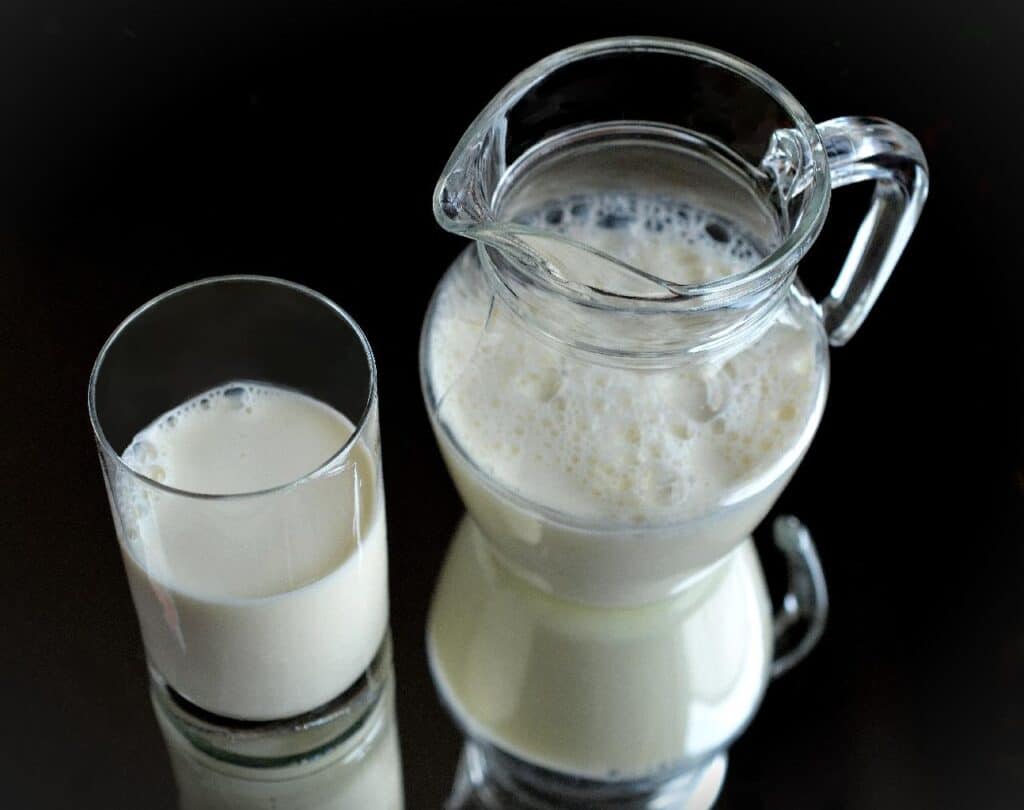Calcium is an important mineral for our lives, and we consume a fair amount of it in dairy products and even our water at home. Without it, our bones would become brittle and break apart easily and it also plays a vital role in our cardiac and nervous systems. But is all that calcium a fire risk? Could it be the reason behind the myth of spontaneous human combustion?
Calcium in its pure form is not particularly flammable. It is a solid metal that melts at about 1548 degrees Fahrenheit (842 degrees Celsius). Some calcium salts and calcium reactions, however, may be more flammable.
This fairly common element is not an extreme fire hazard in most situations, however, there are some things you should know.
Your # 1 priority is keeping your family safe. As a firefighter, I recommend everyone has updated smoke detectors that don’t require battery changes, like these ones from Kidde, a fire extinguisher, like this one from Amerex, and a fire escape ladder if you have bedrooms above the first floor, I recommend this one from Hausse.
Also read: What Makes Something Flammable?
What Is Calcium?

Calcium is one of the most common elements on the planet and the third most abundant metal (with only iron and aluminum occurring more often).
It is generally found in compound form and often in the form of calcium carbonate (which is the main component of limestone).
It wasn’t isolated until the 19th century and it was Humphry Davy, the famous British chemist who also invented the Davy Lamp, who did so and gave calcium its name.
Calcium compounds are used in a wide range of industrial applications and is found in papermaking, electric insulation, soap manufacture, automotive batteries, and much more.
Pure calcium, not so much, as it’s very reactive and expensive to refine.
It is also the fifth most abundant element in our bodies, and it is vital for bone development, neurotransmitters, the ability to contract muscles, and even for healthy fertilization, among many more uses.
Is Calcium Flammable?
Calcium is not flammable, because it requires a high temperature to ignite. This means it does not easily catch fire in most situations.
However, it is highly reactive, and though not flammable, it doesn’t take that much effort to get calcium to burn and it is considered to be combustible.
It is also a real explosion hazard and if it is stored in pure form in the workplace it must be kept in such a way as to reduce fire and explosion risks.
Also read: Is Milk Flammable? Milk Explosions?
Does It Explode In Water?
Calcium doesn’t explode in water, but it does create an explosion risk of fairly extreme proportions.
When it reacts with water it creates two byproducts, the highly flammable gas hydrogen (if you have ever seen the Hindenburg airship disaster you will know that this gas doesn’t need very much effort to burn) and acetylene which is the hydroxide of calcium.
Acetylene is prized as a fuel that burns to yield very high temperatures in welding reactions, and it too is very flammable.
In fact, calcium only produces bubbles when placed in water, it’s not as reactive as say, sodium, but if you’re stood nearby with a lit match, the distinction would probably be lost on you.
It is this reaction that is the reason that calcium is considered an explosion hazard and normally, the metal is kept under oil to prevent it from reacting with moisture in the air.
Also read: Is Potassium Flammable? Violent Reactivity
Why Must You Be Careful To Avoid Touching Calcium Metal?
It is the reaction between Calcium and water that makes touching calcium metal a foolhardy thing to do.
If it is on your skin for just a moment, it will start to react with the water and while the reaction is not as violently exothermic as some other calcium salt reactions, it’s hot enough that it would burn your skin.
And, of course, there are other risks associated with acetylene and hydrogen gas that you’d be better off not taking too.
In general, when working with pure calcium, dry gloves are required to handle the substance and in most cases, it’s best not to touch it all and use instruments to pick it up, cut it, etc.
Also read: Is Lithium Flammable? Battery Explosions
Is Calcium Chloride Flammable?
Calcium chloride is a commonly used compound of calcium and it is not flammable.
In fact, chlorine is a very reactive chemical and when combined with calcium it produces a stable salt that is not toxic and not flammable.
However, if it is brought into contact with zinc or sodium, it will start to produce hydrogen gas from the water in the air surrounding it and as we know, that’s an explosion hazard.
It can also be highly corrosive when put with other metal alloys such as brass or steel.
It’s not a problem if you consume calcium chloride, in fact, it’s often added to drinking water to bring out the flavor of the water and you can use it as an electrolyte to prevent dehydration.
What About Calcium Oxide?
Calcium oxide is the end product of burning calcium in oxygen and as such, it’s not flammable because there’s nothing left to react with oxygen.
But once again, that doesn’t mean that you can store calcium oxide anywhere, in fact, it can react with water (or moisture in the air) and this is a highly exothermic reaction.
That reaction releases so much heat that it can cause other things around the calcium oxide to burst into flame.
Melting Point
For all that it is highly reactive, Calcium, like most metals has a relatively high melting point and you would need to heat it to 1548 degrees Fahrenheit to see it melt (that’s 842 degrees Celsius).
Boiling Point
The boiling point of Calcium is even higher, though it’s worth noting that Calcium is likely to burn before it reaches the boiling point and Calcium gas would require some fairly specific lab equipment to manufacture, and it boils at 2703 degrees Fahrenheit (or 1484 degrees Celsius).
Given the large gap between melting and boiling points, Calcium does not sublimate.
What Are The Hazards of Calcium?
There are hazards associated with working with Calcium and it’s important to be aware of them.
The most likely routes of exposure are breathing it in and getting it on your skin or in your eyes.
It can cause instant problems on exposure such as respiratory irritation, coughing, breathing problems, burning or irritation of the mouth and throat and even your stomach if it’s swallowed, it can cause nausea and vomiting, and contact with the skin is likely to cause corrosion burns and in the eyes, it must be removed immediately.
The main risk of calcium exposure is severe burns but mainly with the pure metal, oxide, or hydroxide, there are plenty of calcium compounds that have no effect on us at all, such as calcium carbonate.
Is It Toxic To Humans?
In its pure form, as we’ve just seen, calcium is not very good for us but that is due to the burns that it causes, it’s not poisonous and if we could consume it without it reacting violently – it would be just fine.
And, in fact, we do consume calcium on a regular basis in milk, cheese, meat, spinach, and a variety of other products, as we’ve already seen it’s essential for human health (and the health of most other animals too) if it were toxic that would probably be a problem.
Is It In Tap Water?
In the United States, most tap water contains some level of calcium, and it ranges in concentration from about 1 mg per liter to 135mg.
Is Calcium In Water Bad For You?
Calcium in tap water was once unfairly maligned as being bad for you. In fact, recent research shows that it’s not bad for you at all and that presence of calcium carbonate, in particular, maybe good for your heart.
However, what’s good for your body isn’t always as good for a shower and high calcium levels in water make the water “hard” and this reduces the ability of the water to produce a lather with soap.
Can You Filter Calcium Out Of Water?
Calcium can be filtered out of your tap water using commercially bought products and though it might be easier on your kettle if you use it for drinking water, it’s probably best to keep the softening process just to the water you use to wash in.
If you don’t have a filter that you can use, then boiling your water also removes calcium from it, you probably know this already if you’ve got an element in your kettle as the limescale tends to accumulate on that over the years.
Sources
1, 2, 3, 4, 5, 6, 7, 8, 9, 10, 11

